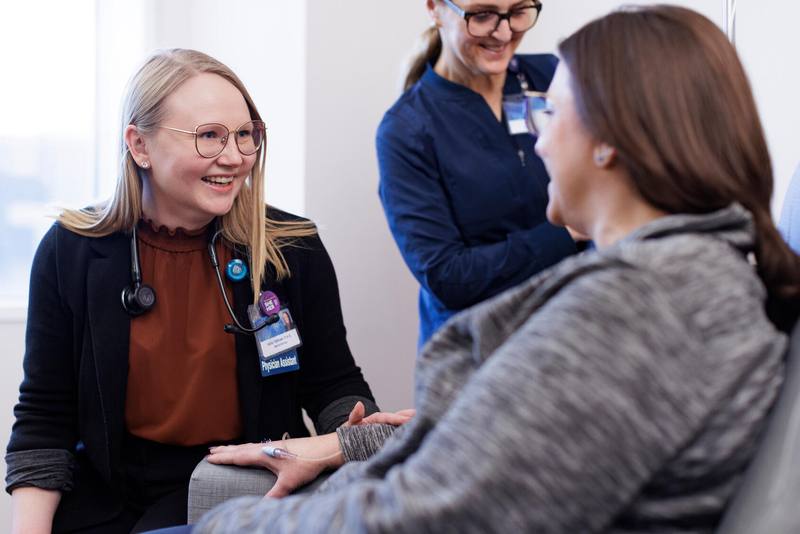-
Cancer
Immunotherapy boosts chemotherapy in combating stage 3 colon cancer

Late-breaking abstract featured at ASCO 2025
ROCHESTER, Minn. — Colon cancer is the third most prevalent form of cancer in the U.S., and while screening has helped detect and prevent colon cancer from spreading, major advancements in treating colon cancer have lagged.
Now, new research led by Mayo Clinic Comprehensive Cancer Center found that adding immunotherapy to chemotherapy after surgery for patients with stage 3 (node-positive) colon cancer — and with a specific genetic makeup called deficient DNA mismatch repair (dMMR) — was associated with a 50% reduction in cancer recurrence and death compared to chemotherapy alone. Approximately 15% of people diagnosed with colon cancer exhibit dMMR and, to date, these tumors appear less sensitive to chemotherapy. The results of the multi-center study were presented during a plenary session at the 2025 American Society of Clinical Oncology (ASCO) Annual Meeting in Chicago.
"The findings from our study represent a major advance in the adjuvant treatment of dMMR stage 3 colon cancer and will now change the treatment for this type of cancer," says oncologist Frank Sinicrope, M.D., who led the study. "It's extremely rewarding to be able to offer our patients a new treatment regimen that can reduce the risk of recurrence and improve their chances of survival."
Until now, the standard treatment after surgery for any stage 3 colon cancer has been chemotherapy. However, the researchers note that approximately 30% of patients experience cancer recurrence despite this treatment.
Watch: Dr. Frank Sinicrope discusses Mayo Clinic immunotherapy study
Journalists: Broadcast-quality sound bites with Dr. Frank Sinicrope are in the downloads at the end of the post. Please "Courtesy: Mayo Clinic News Network."
The clinical trial enrolled 712 patients with dMMR stage 3 colon cancer that had been surgically removed and who had cancer cells in their lymph nodes. The immunotherapy given in this study was an immune checkpoint inhibitor, known as atezolizumab, which activates one's immune system to attack and kill cancer cells, which are responsible for cancer recurrence and spread. The patients — who lived in the U.S. and Germany — received chemotherapy for six months along with immunotherapy and then continued with immunotherapy alone for another six months.
Dr. Sinicrope and others previously studied patients with colon cancer whose cells are unable to repair errors during DNA replication that create a nucleotide mismatch, a condition called dMMR. They noted that these patients' tumors showed a striking increase in inflammatory cells within the tumor, including those that express the target of immune checkpoint inhibitors. This sparked the idea of using immune checkpoint inhibitors to make the immune cells more effective in attacking and killing the cancer cells.
Based on the data from this study, Dr. Sinicrope recommends this combination of immunotherapy and chemotherapy treatment to be the new standard treatment for stage 3 deficient mismatch repair colon cancer. The research team plans to approach the National Comprehensive Cancer Network, a nonprofit organization consisting of 33 leading cancer centers, including Mayo Clinic, with this recommendation.
The study included patients with Lynch syndrome, the most common form of hereditary colon cancer, as these patients can have tumors that show deficient mismatch repair (dMMR).
"We're changing the paradigm in colon cancer treatment. By using immunotherapy at earlier stages of disease, we are achieving meaningful benefits for our patients," says Dr. Sinicrope.
Review the abstract for a complete list of authors, disclosures and funding.
###
About Mayo Clinic
Mayo Clinic is a nonprofit organization committed to innovation in clinical practice, education and research, and providing compassion, expertise and answers to everyone who needs healing. Visit the Mayo Clinic News Network for additional Mayo Clinic news.
About Mayo Clinic Comprehensive Cancer Center
Designated as a comprehensive cancer center by the National Cancer Institute, Mayo Clinic Comprehensive Cancer Center is defining the cancer center of the future, focused on delivering the world's most exceptional patient-centered cancer care for everyone. At Mayo Clinic Comprehensive Cancer Center, a culture of innovation and collaboration is driving research breakthroughs in cancer detection, prevention and treatment to change lives.
Media contact:
- Kelley Luckstein, Mayo Clinic Communications, newsbureau@mayo.edu







